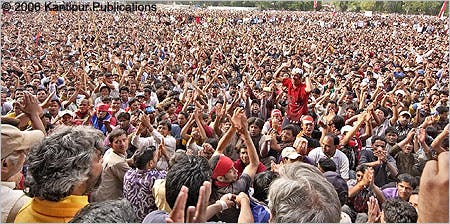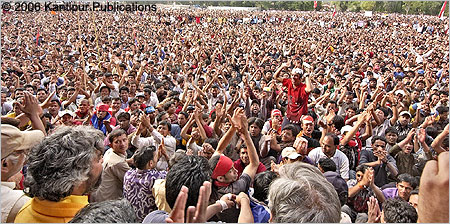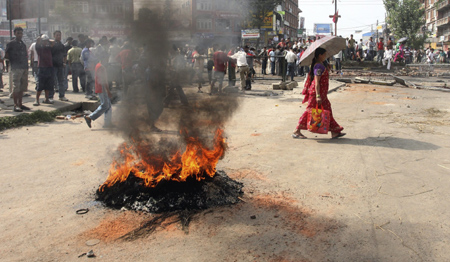IS DEMOCRACY READY FOR US? (VOF MONTH 2: Draft)
Jan 21, 2015
Story



I remember sending an e-mail to a family friend right after democracy was ushered in our country. I was, needless to say, excited about everything democracy brought along. Yes freedom, sweet freedom, that’s all that democracy meant to me then. My friend who lived in India and who is an older and a wiser gentleman wrote back, “Congratulations! But trust me; democracy can never be right for you until you are ready for it.” I don’t know whether I didn’t understand what his statement meant then, or I chose not to understand it. Maybe I didn’t care much for anything that was said against our hard earned democracy….democracy that finally gave us our fundamental rights….democracy that gave us our freedom.
But, today, I see and I understand what he meant. There are at least a hundred armed forces and bodies in the country, each fighting for their individual rights. It is so obvious that law and order situation is deteriorating with each day. The revolution did bring Democracy, but it also brought along with it a lot of other things we do not appreciate. During the insurgency, killing people had become a mere way of taking revenge. The ease with which people are murdered for reasons insignificant has stayed on in an ugly manner.
It is distressing to see how everybody is fighting for “their” rights. Everybody wants to have a chunk for themselves, but how long will we detach “our” needs, “our” aspirations, “our” wants from that of the state? Countrymen’s prosperity is certainly intertwined with the nation’s well-being, but in my country, I cannot fathom why people have started thinking contrary to this. Almost each day we get to see and hear about protests. Hundreds and thousands marching every other day with slogans and protests on the streets has become a regular sight. They dislike something—they throw a bandh (blockage), they are not happy with certain law—they throw a bandh, they are dissatisfied with their wages—they throw a bandh, the questions in the exams are tough—they throw a bandh, hike in food prices, lack of security, microbuses getting torched, someone being beaten, not enough landfill sites…..and so many more. Sometimes, the demands are reasonable, and issues important, and they certainly need to be addressed, but I opine that calling a bandh does nothing but creates logjams, disrupting normal lives, and creating havoc. According to a daily newspaper, The Himalayan Times, the country saw 500 bandhs in 6 months in the year 2009. Isn’t that absurd? Does it not show the weak system that the country is running under? All this rebellion will, perhaps, someday give us all the rights that we deserve. But I worry about today.
Democracy in Nepal has gone through test many a times. It was first introduced in 1951 through an armed revolution against the century old oligarchic Rana Regime. But in December 1960, King Mahendra usurped power and thereby nipped Nepal’s first incipient democracy in the bud. King Mahendra supplanted democratic rule with the Partyless Panchayat regime, a system that continued until 1990. Multiparty democracy was restored in April 1990 after the people demanded its return through mass protests. This second era of democracy lasted longer, and witnessed many achievements that are usually associated with a thriving democracy: a new constitution was promulgated, parliamentary elections were held in 1991, 1994 and 1999 and local elections were held in 1992 and 1997. But Nepal’s second stint with democracy was also derailed by the palace. King Gyanendra, through two royal coups in October 2002 and February 2005, usurped power in a manner reminiscent of his father, King Mahendra. The king’s seizure of power antagonized the public who already viewed him with suspicion. King Gyanendra—who had been crowned after his brother King Birendra along with all members of his family and five other royalties were murdered in June 2001—was not seen as the legitimate heir to the throne, much less accepted as an active and all-powerful head of state. While it is true that the internecine party politics after 1990, the detrimental effects of the CPN-Maoist insurgency, and the overall culture of political decadence had weakened the state of democracy in Nepal, the king overplayed his hand by usurping power.
His wresting of total power not only spurred the political parties to align with the CPN-Maoist but also further alienated the king from the masses. The people responded by taking to the streets in Jana Andolan II, rallying for republicanism: the people wanted a complete extirpation of the institution of monarchy. In the days that followed, the king was ousted from power, and the political parties and the CPN-Maoist cobbled together an interim parliament to run the affairs of the state. The country was supposed to be forged through processes that would ensure Nepal’s radical departure from its past—a departure from the two-and-a-half century old monarchial rule, and a departure from a decade long People’s war carried out by CPN-Maoists. The processes, however, did not match the transformation, and the country has today ended up suffering in the name of democracy.
I had read somewhere: "Democracy may seem an attractive idea. But it is impossible to maintain in real life. An experiment in democracy would take us on the road to disaster.” I understand how true it is in case of my country. Democracy certainly is a wonderful thing. It gives dignity to an individual. But we had never realized that along with democracy so many vices would tag along. It is but very natural for a youngster like me to get frustrated at times, to see the carnage, the lawlessness, the corruption, and this culture of impunity. Every time something unpleasant happens in the country, I try to console myself saying that we are a transitional economy, and every economy has to suffer in this stage. But somewhere deep down I ask myself how fair it is to label the irregularities as the result of the country’s transition? How long will we suffer like this? Isn’t there an end to all this?
The current transitory phase is a critical period for the country: there are many challenges to overcome. These fluid times are offering many opportunities as well to meet these challenges, but the political parties have not been able to capitalize on those opportunities. The heterogeneity of the political groups and their petty politicking to get themselves recognized as real political forces have destroyed the essence of democracy. The Constituent Assembly had guaranteed multi-party competitive politics, republicanism, and popular sovereignty, but all these have worsened even more. The convergences have been overshadowed by the divergent strategies the political parties adopt to realize their partisan interests, frustrating common people like me, raising doubts that the period of transition might be subverted. We had thought that the rising awareness of the people would help in ensuring some sort of accountability among the political parties, but we were overly optimistic. Neither the political parties, not the citizens themselves have been able to move on with the spirit that was required to take the nation towards progress.
Of the many sectors that have been affected, the most depressing is to see the impact in the field of education. It disheartens me when I see my generation doing things that I am not at all proud of. Politics in colleges have not only degraded the quality learning environment, but has turned educational institutions into power play areas. Unionism is good unless it does not meddle with the education system, but our unions are formed with the purpose of meddling. Recently, union members in one of the colleges boycotted post-graduate examination of Business students on the pretext that the questions were difficult. I had thought examinations are supposed to be a test of one’s intellectual capabilities and understanding of the subject matter! Campus chiefs around the country were humiliated. This certainly is misuse of power that has been given to them. Youth groups are supposed to be the change makers, positive changes of course, but the path that many youth are taking is pushing the nation towards a dark future. All this has affected students who go to college not to fight for power, but to immerse themselves in the light of knowledge.
We cannot for sure, forget what Democracy has done to women in my country. We were never safe in our country, and our safety has deteriorated even more. We had thought that life would get better after democracy, but we were wrong. I don’t remember the last time I felt safe. I know that I could be harmed, or raped, or murdered, and the culprit would go scot-free. Many women meet this fate, not only from the hands of general public, but from those who are supposed to be the protectors, including the army. We hear so many cases of women being raped by Maoist rebels, and army personnel, but nobody does anything about it, because it is hard to punish them, or that’s what everybody thinks.
I miss those old days, the days when we were happy; I miss my country being called a nation where peace prevails, a nation where people follow Buddha’s preaching. Everything has changed, and seems like nothing have changed for the good. The only Hindu kingdom in the country sometime back, Nepal was transformed into a secular state with good intentions. This was supposed to be a move towards assimilation but crimes in name of religion have increased ever since. I cannot forget the bombing that took place in one of the churches around Kathmandu, which was planned by a Hindu faction to target the Christians. This was saddening—a little girl was killed in the blast—she was not given a choice of religion when she was born—and still met the fate she did. This clearly shows how impunity has taken over the nation. People have a feeling that they can get away with anything and everything. Chirag Bangdel, a young Nepali poet has captured the situation of vulnerability in the country in his poem Immunity which I would like to quote here:
“Ten thousand people
on the street, protesting.
Angry words
and slogans,
soon – gunshots,
some run,
some fight on.
Fifty get wounded
and a man of twenty-two dies.
A curfew follows,
lasts five hours.
The next morning
people rush to work
and vendors sell their wares.
Even the blood stains on the road
fade away –
too many cars on the streets.”
What he describes through this poem is so true. We are so used to hearing news of people being killed, that every person who is killed becomes a statistic for others, unless of course, when it happens to one’s own family member. This is rather upsetting. How can we forget that with every person killed, we are killing a future, we are taking a life? This is unfair and shows the dark reality of what we are turning into. We need to change, we need to be empathetic. We always were considerate, but I don’t understand what has got into us—vice has taken over our beings.
This country that we live in was not born yesterday. We have a history. We have wonderful culture and traditions. Our forefathers have given in blood, sweat and tears. And now with all this turmoil I worry we might even lose them all. There are so many of us taking advantage of “democracy” and getting away with appalling actions. India has an old history of democracy, and it is still struggling. It is understandable that the entire process will take some time to be accommodated in the system, but I wonder “how long?” Philosopher Paul Woodroff argues that “everybody in the world is ready for democracy, if by 'ready' we mean 'eager’.” Nepalese certainly were eager for democracy, but it doesn’t mean that they were “ready” for it. The question here however is “Is democracy ready for us?” Is it ready to be misused in the name of liberty, in the name of civil supremacy, and in the name of exercising rights?
(The data on democracy has been reproduced from the Report: Nepal in Transition, published by International Institute for Democracy and Electoral Assistance)
This article is part of a writing assignment for Voices of Our Future, which is providing rigorous web 2.0 and new media training for 31 emerging women leaders. We are speaking out for social change from some of the most forgotten corners of the world. Meet Us.




